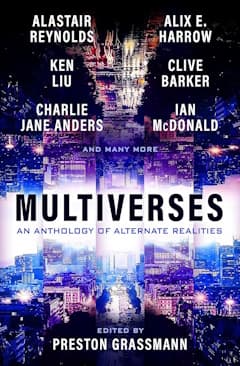
Multiverses edited by Preston Grassmann
(Titan, 2023)
Reviewed by John Dodd
Anthologies are often a mixed bag, ranging from superb to average, and it’s difficult to review the book as a whole, particularly when there are 18 submissions to cover, and most of these need more than forty words to do them justice.
Multiverses has three categories of story, Parallel Worlds, Alternate Histories and Fractured Realities, each one dealing with a different aspect of Multiversial theory. There are several stories and at least one poem in each of the categories, and while I’m not a fan of poetry, this made a nice diversion.
My particular favourites though…
‘Banish’—A story of surgeons operating at the cutting edge of technology suddenly realising that one of the people that they’ve been sent to operate upon is a copy of a person who was deeply evil in another reality. The conundrum of possibly healing someone who shows every sign of becoming what they were in another time and place was told with compassion and fervour, and the ending was superb, with a sublime twist on the use of existing technology.
‘Nine Hundred Grandmothers’—Cyborg Grandma, Shoggoth Grandma, Death Metal Grandma… If those three descriptions don’t have your interest, then leave this be, but you’d be missing out on one of the most quirky and interesting stories this year. What happens when you have access to multiple dimensions and your normal parents and grandmother can’t talk you out of the ill-advised course of action you’re intent on taking? Loved every second of this.
‘Brief history of the Trans Pacific Tunnel’—What if the great minds of the time chose to build ungodly things, monuments to their greatness, and how would they do this. A cautionary tale of how most things that were wonders in their time were made from the suffering and sweat of those who would see no recognition for them and often gave their lives in the construction, whilst still making the point of how those titanic achievements shaped the world we know.
‘Days of Magic, Nights of War’—Beautiful and moving poem that made me reconsider my normal bias against poetry.
‘A Witches guide to Escape’—What if (as we all have suspected at some point) librarians were magic, what if they held within their knowledge the secrets that we all needed, what if their recommendations were not recommendations, but the need (and I’m quoting from the book here): ‘To give people the books they need most’.
Wonderful story, it took me back to the days when there was no internet, when the library was the magical place where you trained your mind, when you could walk into a Dojo and recognise the odour of adrenaline and sweat as the promise that you would learn to fight, and you could walk into a library and know the smell of old paper and contemplation as the promise that you would learn. It isn’t enough that you know what a book is. It’s necessary that you can be sure that the book is right for those you give it to.
I don’t have enough words available to be able to comment on all the stories, those five were the ones that to me were the standouts of the book, but all the stories had a point to be made and the poems were understandable even to a philistine like me. There are points where the writing takes on a quirk of its own, such as ‘The Set’, where the protagonist walks through different universes as easily as if they were moving between scenes in a film, and ‘Crunchables’, where it’s possible to get lost in different universes when all you’re doing is trying to find the right cat food.
Overall, this is an excellent series of stories and I’d recommend it for anyone who has an interest in taking an in depth look at the ways in which alternate universes (and alternate ways of thinking) can be explored.
Review from BSFA Review 22 - Download your copy here.
